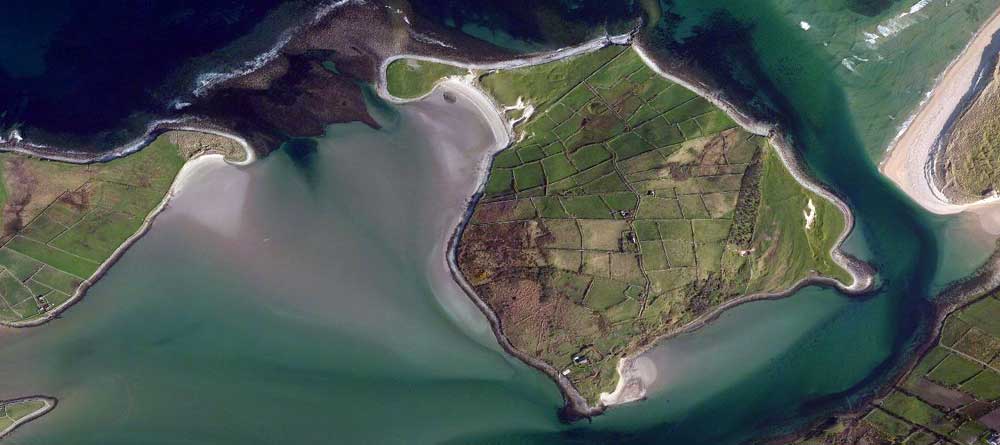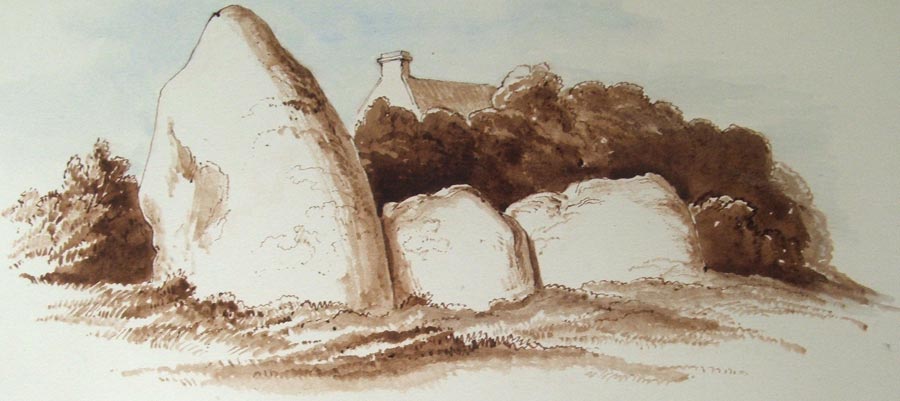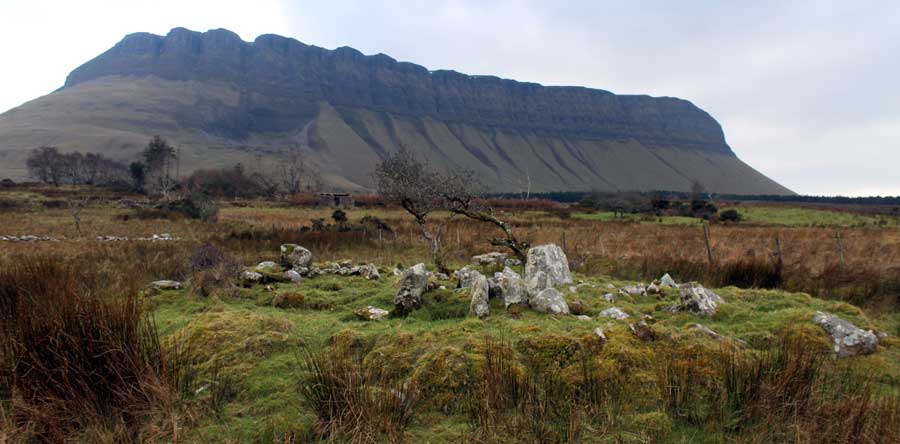Evans Wentz in north Sligo, 1908
COUNTY SLIGO, AND THE TESTIMONY OF A PEASANT SEER
The Ben Bulben country in County Sligo is one of those rare places in Ireland where fairies are thought to be visible, and our first witness from there claims to be able to see the fairies or 'gentry' and to talk with them. This mortal so favoured lives in the same townland where his fathers have lived during four hundred years, directly beneath the shadows of Ben Bulbin, on whose sides Dermot is said to have been killed while hunting the wild-boar. And this famous old mountain, honeycombed with curious grottoes ages ago when the sea beat against its perpendicular flanks, is the very place where the 'gentry' have their chief abode.
Even on its broad level summit, for it is a high square table-land like a mighty cube of rock set down upon the earth by some antediluvian god, there are treacherous holes, wherein more than one hunter may have been lost for ever, penetrating to unknown depths; and by listening one can bear the tides from the ocean three or four miles away surging in and out through ancient subterranean channels, connected with these holes. In the neighbouring mountains there are long caverns which no man has dared to penetrate to the end, and even dogs, it is said, have been put in them never to emerge, or else to come out miles away. One day when the heavy white fog-banks hung over Ben Bulbin and its neighbours, and there was a weird almost-twilight at midday over the purple heather bog-lands at their base, and the rain was falling, I sat with my friend before a comfortable fire of fragrant turf in his cottage and heard about the 'gentry':—
Encounters with the' Gentry'.—
'When I was a young man I often used to go out in the mountains over there (pointing out of the window in their direction) to fish for trout, or to hunt; and it was in January on a cold, dry day while carrying my gun that I and a friend with me, as we were walking around Ben Bulbin, saw one of the gentry for the first time. I knew who it was, for I had heard the gentry described ever since I could remember; and this one was dressed in blue with a head-dress adorned with what seemed to be frills. When he came up to us, he said to me in a sweet and silvery voice, "The seldomer you come to this mountain the better. A young lady here wants to take you away."
Then he told us not to fire off our guns, because the gentry dislike being disturbed by the noise. And he seemed to be like a soldier of the gentry on guard. As we were leaving the mountains, he told us not to look back, and we didn't. Another time I was alone trout-fishing in nearly the same region when I heard a voice say, "It is ------ bare-footed and fishing." Then there came a whistle like music and a noise like the beating of a drum, and soon one of the gentry came and talked with me for half an hour. He said, "Your mother will die in eleven months, and do not let her die unanointed." And she did die within eleven months. As he was going away he warned me, "You must be in the house before sunset. Do not delay! Do not delay! They can do nothing to you until I get back in the castle."
As I found out afterwards, he was going to take me, but hesitated because be did not want to leave my mother alone. After these warnings I was always afraid to go to the mountains, but lately I have been told I could go, if I took a friend with me.'
'Gentry' Protection.—
'The gentry have always befriended and protected me. I was drowned twice but for them. Once I was going to Dernish Island, a mile off the coast. The channel is very deep, and at the time there was a rough sea, with the tide running out, and I was almost lost. I shrieked and shouted, and finally got safe to the mainland. The day I talked with one of the gentry at the foot of the mountain when he was for taking me, he mentioned this, and said they were the ones who saved me from drowning then.'
'Gentry' Stations.—
'Especially in Ireland, the gentry live inside the mountains in beautiful castles; and there are a good many branches of them in other countries. Like armies, they have various stations and move from one to another. Some live in the Wicklow Mountains near Dublin.'
'Gentry' Control Over Human Affairs.—
'The gentry take a great interest in the affairs of men, and they always stand for justice and right. Any side they favour in our wars, that side wins. They favoured the Boers, and the Boers did get their rights. They told me they favoured the Japanese and not the Russians, because the Russians are tyrants. Sometimes they fight among themselves. One of them once said, "I'd fight for a friend, or I'd fight for Ireland."'
The 'Gentry' Described.—
In response to my wish, this description of the 'gentry' was given:—
'The folk are the grandest I have ever seen. They are far superior to us, and that is why they are called the gentry. They are not a working class, but a military-aristocratic class, tall and noble-appearing. They are a distinct race between our own and that of spirits, as they have told me. Their qualifications are tremendous. "We could cut off half the human race, but would not," they said, "for we are expecting salvation."
And I knew a man three or four years ago whom they struck down with paralysis. Their sight is so penetrating that I think they could see through the earth. They have a silvery voice, quick and sweet. The music they play is most beautiful.
They take the whole body and soul of young and intellectual people who are interesting, transmuting the body to a body like their own. I asked them once if they ever died, and they said, "No; we are always kept young." Once they take you and you taste food in their palace you cannot come back. You are changed to one of them, and live with them for ever. They are able to appear in different forms. One once appeared to me, and seemed only four feet high, and stoutly built. He said, "I am bigger than I appear to you now. We can make the old young, the big small, the small big."
One of their women told all the secrets of my family. She said that my brother in Australia would travel much and suffer hardships, all of which came true; and foretold that my nephew, then about two years old, would become a great clergyman in America, and that is what he is now. Besides the gentry, who are a distinct class, there are bad spirits and ghosts, which are nothing like them. My mother once saw a leprechaun beside a bush hammering. He disappeared before she could get to him, but he also was unlike one of the gentry.'
EVIDENCE FROM GRANGE
Our next witness, who lives about three miles from our last witness, is Hugh Currid, the oldest man in Grange; and so old is he that now he does little more than sit in the chimney-corner smoking, and, as he looks at the red glow of the peat, dreaming of the olden times. Hugh knows English very imperfectly, and so what he narrated was in the ancient Gaelic which his fathers spoke. When Father Hines took me to Hugh's cottage, Hugh was in his usual silent pose before the fire. At first he rather resented having his thoughts disturbed, but in a few minutes he was as talkative as could be, for there is nothing like the mention of Ireland to get him started. The Father left us then; and with the help of Hugh's sister as an interpreter I took down what he said:--
The Flax-Seller's Return from Faerie.—
'An old woman near Lough More, where Father Patrick was drowned, who used to make her living by selling flax at the market, was taken by the gentry, and often came back afterwards to her three children to comb their hair. One time she told a neighbour that the money she saved from her dealings in flax would be found near a big rock on the lake-shore, which she indicated, and that she wanted the three children to have it.'
A Wife Recovered from the 'Gentry'.—
'A man's young wife died in confinement while he was absent on some business at Ballingshaun, and one of the gentry came to him and said she had been taken. The husband hurried home, and that night he sat with the body of his wife all alone. He left the door open a little, and it wasn't long before his wife's spirit came in and went to the cradle where her child was sleeping. As she did so, the husband threw at her a charm of hen's dung which he had ready, and this held her until he could call the neighbours. And while they were coming, she went back into her body, and lived a long time afterwards. The body was stiff and cold when the husband arrived home, though it hadn't been washed or dressed.'
A TAILOR'S TESTIMONY Our next witness is Patrick Waters, by trade a tailor, living in Cloontipruckilish, a cross-road hamlet less than two miles from Hugh Currid's home. His first story is a parallel to one told about the minister of Aberfoyle who was taken by the 'good people':--
The Lost Bride.—
'A girl in this region died on her wedding-night while dancing. Soon after her death she appeared to her husband, and said to him, "I'm not dead at all, but I am put from you now for a time. It may be a long time, or a short time, I cannot tell. I am not badly off. If you want to get me back you must stand at the gap near the house and catch me as I go by, for I live near there, and see you, and you do not see me." He was anxious enough to get her back, and didn't waste any time in getting to the gap. When he came to the place, a party of strangers were just coming out, and his wife soon appeared as plain as could be, but he couldn't stir a hand or foot to save her. Then there was a scream and she was gone. The man firmly believed this, and would not marry again.'
The Invisible Island.—
'There is an enchanted island which is an invisible island between Innishmurray and the mainland opposite. It is only seen once in seven years. I saw it myself, and so did four or five others with me. A boatman from Sligo named Carr took two strange men with him towards Innishmurray, and they disappeared at the spot where the island is, and he thought they had fallen overboard p. and been drowned. Carr saw one of the same men in Connelly (County Donegal), some six months or so after, and with great surprise said to him, "Will you tell me the wonders of the world? Is it you I saw drowned near Innishmurray?" "Yes," he said; and then asked, "Do you see me?" "Yes," answered Carr. "But," said the man again, "you do not see me with both eyes?" Then Carr closed one eye to be sure, and found that he saw him with one eye only. And he told the man which one it was. At this information the fairy man blew on Carr's face, and Carr never saw him again.'
A Dream.—
'My father dreamt he saw two armies coming in from the sea, walking on the water. Reaching the strand, they lined up and commenced a battle, and my father was in great terror. The fighting was long and bloody, and when it was over every fighter vanished, the wounded and dead as well as the survivors. The next morning an old woman who had the reputation of talking with the fairies came in the house to my father, who, though greatly disturbed over the dream, had told us nothing of it, and asked him, "Have you anything to tell? I couldn't but laugh at you," she added, and before my father could reply, continued, "Well, Jimmy, you won't tell the news, so I will." And then she began to tell about the battle. "Ketty!" exclaimed my father at this, "can it be true? And who were the men beside me?" When Ketty told him, they turned out to be some of his dead friends. She received her information from a drowned man whom she met on the spot where the gentry armies had come ashore; and, in the place where they fought, the sand was all burnt red, as from fire.' As the narrator reflected on this dream story, he remarked about dreams generally:--
'The reason our dreams appear different from what they are is because while in them we can't touch the body and transform it. People believe themselves to be with the dead in dreams.' During September 1909, when I had several fresh interviews with Patrick Waters, I verified all of his 1908 testimony such as it appears above; and among unimportant anecdotes I have omitted from the matter taken down in 1908 one anecdote about our seer-witness from County Sligo, because it proved to be capable of opposite interpretations.
Patrick Waters, however, like many of his neighbours, thoroughly supports Hugh Currid's opinion that our seer-witness 'surely sees something, and it must be the gentry'; and of Hugh Currid himself, Patrick Waters said, 'Hugh Currid did surely see the gentry; he saw them passing this way like a blast of wind.' Patrick's fresh testimony now follows, the story about Father Patrick and Father Dominick coming first:--
Father Patrick and Father Dominick.—
'Father Patrick Noan while bathing in the harbour at Carns (about three miles north-west of Grange) was drowned. His body was soon brought ashore, and his brother, Father Dominick Noan, was sent for. When Father Dominick arrived, one of the men who had collected around the body said to him, "Why don't you do something for your brother Patrick?" "Why don't somebody ask me?" he replied, "for I must be asked in the name of God."
So Jimmy McGowan went on his knees and asked for the honour of God that Father Dominick should bring Father Patrick back to life; and, at this, Father Dominick took out his breviary and began to read. After a time he whistled, and began to read again. He whistled a second time, and returned to the reading. Upon his whistling the third time, Father Patrick's spirit appeared in the doorway. '"Where were you when I whistled the first time?" Father Dominick asked. "I was at a hurling match with the gentry on Mulloughmore strand."
"And where were you at the second whistle?" "I was coming over Corrick Fadda; and when you whistled the third time I was here at the door." Father Patrick's spirit had gone back into the body, and Father Patrick lived round here as a priest for a long time afterwards. 'There was no such thing as artificial respiration known hereabouts when this happened some fifty or sixty years ago. I heard this story, which I know is true, from many persons who saw Father Dominick restore his brother to life.'



